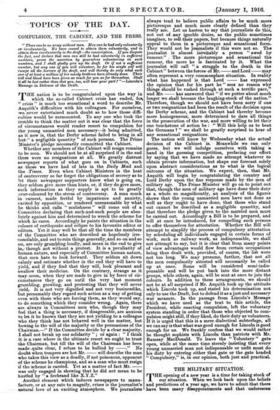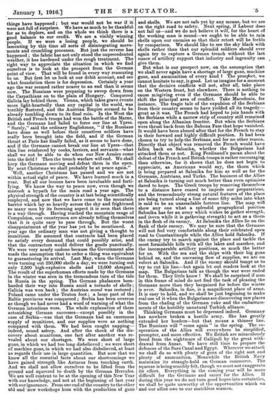THE MILITARY SITUATION. T HE opening of a new year is
a time for taking stock of our situation. When we look back upon the beliefs and predictions of a year ago, we have to admit that there have been many disappointments and that unforeseen things have happened ; but war would not be war if it were not full of surprises. We have as much to be thankful, for as to deplore, and on the whole we think there is a good balance to our credit. We are a visibly 'winning people. If we were a losing people, we should be lamenting by this time all sorts of disintegrating move- ments and crumbling processes. But just the reverse has 'happened ; the fabric has not only stood the unprecedented weather, it has hardened under the rough treatment. The tight way to appreciate the situation in which we find ourselves is to look at the prospect from the German point of view. That will be found in every way reassuring to us. But first let us look at our debit account, and see what foundation there is for depression. Certainly a year ago the war seemed rather nearer to an end than it seems now. The Russians were preparing to sweep down from the Carpathians on to the plain of Hungary. Conquered Galicia lay behind them. Vienna, which takes grave events more light-heartedly than any capital in the world, was terribly flustered, and the Austrian Empire seemed to be already tumbling down to its final ruin. In the West the British and French troops had won the battle of the Marne, and the Germans had failed to force our line at Ypres. " Surely," said the ordinary Englishman, " if the Russians have done so well before their countless soldiers have really been brought into the field, and if the German thrust at Paris has finally failed, as it seems to have done, and if the Germans cannot break our line at Ypres—that thin line reinforced by cooks, farriers, and servants—what shall we not be able to do when our New Armies come into the field ? Then the trench warfare will end. We shall keep the Germans moving and defeat them in the open. By next Christmas we shall probably be at peace again."
Well, another Christmas has passed and we are not within actual sight of peace. We have learned much in a year. But all our lessons have been invaluable and forti- fying. We know the way to peace now, even though' we mistook a bypath for the main road a year ago. The physical strength of the country is at last being scientifically employed, and now that we have come to the mountain barrier which lay so heavily across the sky and frightened so many men by its frowning aspect it is seen that there is a way through. Having reached the mountain range of Compulsion, our countrymen are already telling themselves that it is quite easy to pass through. But the worst disappointment of the year has yet to be mentioned. A year ago the ordinary man was not giving a thought to munitions. He assumed that contracts had been placed to satisfy every demand that could possibly arise, and that the contractors would deliver the goods punctually. We were very nearly undone because the Government also made the assumption that to order a thing was equivalent to guaranteeing its arrival. Last May, when the Germans were turning out 250,000 shells a day, we were turning out only 2,500 high-explosive shells and 13,000 shrapnel. The result of the superhuman efforts made by the Germans in the winter was seen in the tremendous turn of the tide in Russia in the spring. The German phalanxes bom- barded their way into Russia amid a tornado of shells ; Galicia was won back ; the Austrian moral was restored ; Poland came under the Teuton foot ; a large part of the Baltic provinces was conquered ; Serbia has been overrun as though we had never had a word of warning of what the German intentions were. The whole explanation of these astonishing German successes—except possibly in the case of Serbia—was that the Germans had an enormous supply of munitions, and our supplies were as nothing compared with them. We had been caught napping— indeed, sound asleep. And after the shock of the dis- covery about munitions, one fact after another was re- vealed about our shortages. We were short of large guns, in which we had too long disbelieved ; we were short of machine guns, in which we had also disbelieved, at least as regards their use in large quantities. But now that we know all the essential facts about our shortcomings we have gained strength like Antaeus from touching earth. And we shall not allow ourselves to be lifted from the ground and squeezed to death by the German Hercules. We are well content to be at the opening of this New Year with our knowledge, and not at the beginning of last year with our ignorance. From one end of the country to the other Old and 'new workshops hum with the production of guns and shells. We are not safe yet by any means, but we are on the right road to safety. Next spring, if Labour does not fail us—and we do not believe it will, for the heart of the working man is sound—we ought to be able to rain shells upon our enemies so that their retort will be feeble by comparison. We should like to see the sky black with shells rather than that our splendid soldiers should ever again try to capture a German trench without the last ounce of artillery support that industry and ingenuity can give them. But what is our prospect now, on the assumption that we shall never again have a shortage of large guns, machine guns, and ammunition of every kind ? The prosiiect, we cannot hesitate to say, is good. Let us imagine for a moment that the decisive conflicts will not, after all, take place on the Western front, but elsewhere. There is nothing to cause misgiving even if the Germans should be able to shift the principal area of conflict. Take Macedonia, for instance. The tragic tale of the expulsion of the Serbians from their country seems to have yielded all its tragedy— great as it was. The French had hoped to join hands with the Serbians while a narrow strip of country still remained open along the Albanian frontier. But when the Serbians were thrust back from the Babuna Pass that hope vanished. It would have been absurd after that for the French to stay in their forward and highly difficult position. It had been chosen to try to help the Serbians, and for no other reason. Directly that object was removed the French would have fallen back on Salonika, whether the Bulgarians had attacked them or not. King Ferdinand's paean about the defeat of the French and British troops is rather encouraging than otherwise, for it shows that he does not begin to appreciate, as Americans would say, the thorn which is being prepared at Salonika for him as well as for the Germans, Austrians, and Turks. The business of the Allies at Salonika is turning out much better than even optimists dared to hope. The Greek troops by removing themselves to a distance have ceased to impede our preparations, and the tremendously strong natural features of the place are being turned along a line of some fifty miles into what is said to be an unassailable fortress line. The map will show any one what a splendid geographical position Salonika has for an army which wishes to gather strength, and (even while it is gathering strength) to act as a thorn in the flesh of its enemy. At Salonika the Allies lie on the flank of their enemy. We may be sure that the Germans will not feel very comfortable along their celebrated open road to Constantinople while the Allies hold Salonika. If the enemy try to march against the place and tackle the most formidable hills with all the lakes and marshes, and the incomparable artillery positions, so much the better for us. With the sea and the ships with their big guns behind us, and the unceasing flow of supplies, we are on velvet at Salonika. And if the enemy should tempt us to try to cut his line—but again let out readers look at the map. The Bulgarians talk as though the war were ended for them. They little know ! We shall be surprised if men in this frame of mind do not find the task of pleasing the Germans more than they bargained for before the winter is over. Salonika, in fine, is a magnificent place of arms. It is easy to hold, and we shall be just beginning to make real use of it when the Bulgarians are discovering raw places from the chafing of the German yoke and the embarrass- ments of the horribly unnatural Turkish alliance.
Thinking Germans must be depressed indeed. Germany has nowhere broken a hostile army. She has greatly extended her borders—but that means a thinner line. The Russians will " come again " in the spring. The co- operation of the Allies will everywhere be simplified, prompter, and more effective. We British are miraculously freed from the nightmare of Gallipoli by the great with- drawal from Anzac. We have still time to prepare the defences of the Suez Canal and Egypt. Wherever we attack we shall do so with plenty of guns of the right sort and plenty of ammunition. Meanwhile the British Navy maintains its strangle-hold on German commerce. The squeeze is being sensibly felt, though we must not exaggerate its effect. Everything in the coming year will be more difficult for the Germans and easier "for the Allies. If durinab this year we do not turn good hopes into certainties, we shall be quite unworthy of the opportunities which we and our allies owe to our matchless seamen.











































 Previous page
Previous page